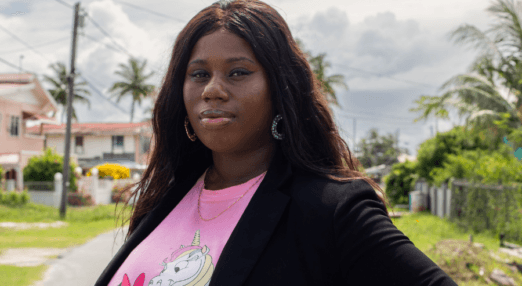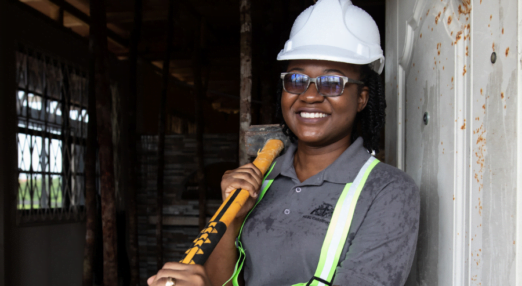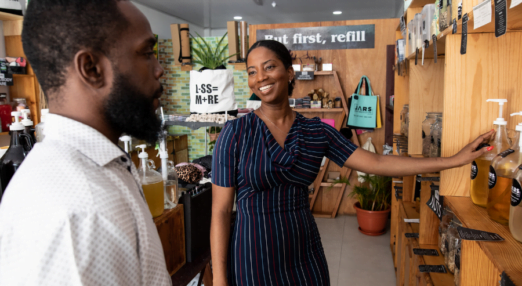Supporting Women Entrepreneurs in a Post-Pandemic World
Our Trustee Chris Lane shares his thoughts on the crisis’ impacts.

The global pandemic presents an extremely challenging time for women entrepreneurs in low and middle income countries — those the Cherie Blair Foundation for Women is dedicated to supporting. Our Trustee Chris Lane shares his thoughts on the crisis’ impacts.
It is said that coronavirus does not discriminate. That may be true from an epidemiological perspective, but I fear that, once this is over, the lived experience of so many women around the world will tell a very different story.
As a Trustee of the Cherie Blair Foundation for Women, I know from what we hear from our staff, partners, and beneficiaries that the landscape has changed. Our bold ambition over the next three years is to enable 100,000 women to realise their entrepreneurial potential, provide better for themselves and their families, and play a more active economic role in more equal societies.
That job just got harder.
The reason the Cherie Blair Foundation for Women exists is that, even before this crisis, women around the world, particularly those from minority ethnic backgrounds, were already far more likely to be economically vulnerable than men. The systematic roll-out of lockdown measures is necessary to save lives but devastating to livelihoods. Most health and social care workers are women. That means they are more exposed to the risk of coronavirus infection. We also know that in every society, women bear the heaviest burden of unpaid caring responsibilities for children, the elderly, and sick family members at home. With schools and childcare facilities closed, this burden only increases. As also evidenced during the Ebola crisis, this again means that women are more likely to become infected. In addition, in times of social and economic difficulty, sadly, women are most exposed to risks of domestic violence.
In my day job with the Westminster Foundation for Democracy (WFD), we have acted over recent years to support partners to build more open, accountable, and inclusive political processes. In many of our partner countries, the voices of women are now heard louder than ever before. In turn, these more inclusive democratic institutions have done a better job of passing higher quality legislation and holding their governments to account. Strengthened democratic systems can protect the rights and freedoms of all, but particularly women, during good and bad times.
A crisis such as this presents unprecedented threats to this progress. WFD has argued that Parliaments are vital to the process of legitimately determining, and qualifying, what society needs, and to ensuring that the Government meets those needs. This is important both now and as we deal with the aftermath of the pandemic. As my WFD colleague Victoria Hassan said recently: “The provision of end-to-end democracy can help save lives. Without democracy we cannot legitimately ensure that the pandemic does not harm or disproportionately take its toll on the most vulnerable in society”. But, as well as threats, there are also huge opportunities for institutions to innovate.
Of course, the need to address the big picture infrastructure challenges, triggered by coronavirus and our response to it, within our political systems and our economies is critical. However, political and economic systems are simply made up of billions of people and it is equally critical that we address the individual challenges our workers and entrepreneurs now face. Individuals, wherever they may live, have their own hopes and dreams and an unparalleled capacity to cooperate in a spirit of shared endeavour. Coronavirus will not change this. But the post-coronavirus landscape, replete with challenges and barriers – some new, some old – for women will have changed in villages, towns, and cities across the world. For many women entrepreneurs in developing countries, this means new knowledge, skills, and tools will be needed to overcome those barriers. For some, there will also be new opportunities to grasp as lifestyles and workstyles change, potentially forever, providing space for exciting new products and services.
These are fast-moving times. It is still too early to say, with any certainty, what these challenges and opportunities will be. However, one thing is certain. With the support and open-mindedness of our donors and partners, the Cherie Blair Foundation for Women will adapt and do whatever it takes to achieve our ambitions in a post-coronavirus world.
We must work harder than ever to support all those incredible women who are essential to a shared and better future.
Discover more blogs:
-

Women entrepreneurs & the long road to equality
To mark Women's Entrepreneurship Day 2024, we're shining a light on the contributions of women entrepreneurs and the gender-specific challenges women face in business ownership.
Read more
-

Inside Road to Growth: 3 ways the programme supports Guyanese women entrepreneurs
Our partners, ActionINVEST Caribbean Inc., share an inside look at Road to Growth and the benefits it has for women's businesses.
Read more
-

Women’s MSMEs boost economies and promote sustainability
Our CEO, Dhivya O'Connor, shares why women's Micro, Small, and Medium-sized Enterprises (MSMEs) are crucial for global prosperity.
Read more